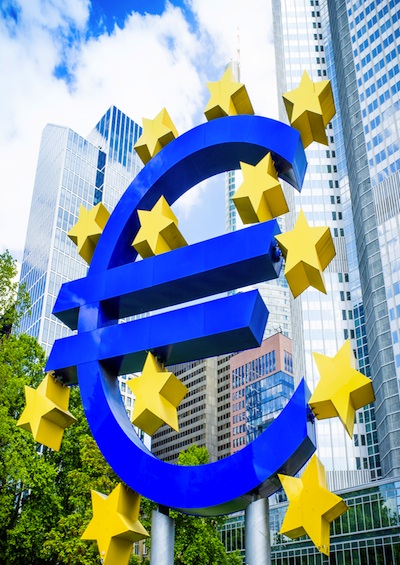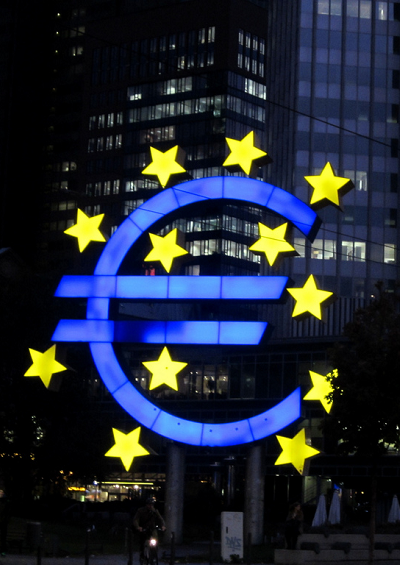Madame Lagarde: End Draghi’s Half Measures!
Rather than having the ECB continue its path of raising just the boats of the rich, it is high time for the delivery of “helicopter money” to everyday Europeans.
November 1, 2019

Let’s stop denying the obvious: The ECB’s cheap money policy only helps if people and companies are willing and able to take on more debt. In an environment of low growth and already high debt levels, both preconditions for successful stimulus of the Eurozone economy are not in place.
No wonder then that, four years and 2.6 billion euros of asset purchases by the ECB later, we still face the same challenges: Weak growth, economic divergence and a fragile currency union that is ill-prepared for shocks like an intensified trade war, a disorderly Brexit or a Chinese recession.
ECB Funding speculators, not investors
The only winners of the policies of the ECB have been those who could use the “fresh money” to speculate and buy existing assets. Because they are wealthy already, they have the financial standing in the eyes of their banks to take up debt.
They all love the fact that this elitist insider deal is sold to the European public at large as a presumably noble “rescue mission.” What this has to do with making Europe’s economy more productive remains the ECB’s secret.
No wonder then that, according to the Swiss bank UBS, Munich, Amsterdam and Frankfurt feature in the top five (the others being Hong Kong and Toronto) of the global cities with the highest bubble-risk in the real estate market.
Fueled by cheap credit, buyers are willing to pay up to 50 times yearly rents for Munich real estate. That is clearly not sustainable in the face of an upcoming recession in Germany’s automotive industry which plays an important role in the Munich area. BMW has already announced pay cuts for thousands of senior-level managers.
The European left doesn’t know what it wants
What is particularly stunning to observe is that the people on the political left in Europe who advocate so strongly and so loudly for ultra-loose monetary policies are the very same people who justifiably bemoan the rise of inequality.
What they just do not seem to understand is that it is the ECB’s monetary policy that is the root cause of the rising inequality inside Europe.
The Cantillon Effect
The past four years are another proof of the “Cantillon Effect.” The Irish economist Richard Cantillon wrote about it already in 1734: If new money is brought into circulation, the ones benefitting the most are those who are getting it first. They can buy assets and goods earlier and therefore at lower prices than those who get the money later.
Currently, the players in financial markets and those able to take on credit to buy real estate profit the most as they can generate near riskless profits. The real economy does not benefit, while the average citizen faces rising house prices and rents and therefore a deteriorated financial position.
At zero or even negative rates, the average saver loses money and does not benefit from the asset price inflation. A redistribution of wealth results from the poorer to the richer.
For their part, institutions as diverse and as successful (and unsuccessful, respectively) as the IMF, Blackrock and Deutsche Bank all play with different versions of central bank financed public spending.
To keep their own boats and those of the elites they serve afloat, they disregard the increased risk of losing central banks autonomy and are prepared to walk into a world of social bank socialism. That is a world where the price of money and the scarcity of money don’t fulfill their role in the efficient allocation of resources anymore.
Direct government funding next
It is no surprise then that the demand for direct government funding via the central banks gets louder. Be it in the form of “helicopter money,” as defined by the late Milton Friedman, be it as Modern Monetary Theory (MMT) which is neither modern nor monetary but asking for continuous and unlimited funding of governments by central banks.
In his farewell interview with the FT, Mario Draghi envisaged direct funding of governments.
Most probably, the fight against climate change will provide the official excuse to embark on these measures. Mrs. Lagarde, the designated successor of Mr. Draghi as head of the ECB, has already declared in her presentation to members of the European parliament that she sees an important role for the central bank in supporting the fight against climate change.
In reality, this is not about fighting global warming, but rather fighting the upcoming ice age in the world economy, labeled by economist Larry Summers as “secular stagnation.”
Wasting money
Politicians are known never to miss an opportunity to spend money, even if it is spent on more or less sensible projects which will not improve the long-term growth potential of the economies of the West.
Whoever doubts this analysis should take a deeper look at how German politicians wasted the windfall of higher taxes and lower interest expenses of the past 10 years. Most of the 480 billion Euros of additional spending went into social welfare, i.e., higher pensions and health care for the elderly.
At the same time, infrastructure and digitalization remain critically underfunded, not to mention the military which is lacking the basic level of having at least functioning equipment.
The losers of these policies will again be the middle class. Higher government spending will benefit those who receive them directly. In contrast, higher inflation rates, more asset inflation and continuously low interest rates will make the middle class relatively poorer. No doubt, this will increase the attractiveness of populist politicians in the coming years.
Give money to the people
I think it would be better to learn from the mistakes of the past five years and give the money to the public, not to politicians. The reasons for doing so are obvious:
• As everybody will receive the money at the same time, the Cantillon Effect mentioned above would not take place. There would be no group of privileged benefitting from earlier access to the fresh money.
• Giving every person the same amount would be fairer and even have a social component. Especially the middle class that has carried the burden of financing the welfare state in the past would finally receive something in exchange.
• Overindebted households could use the money for paying back debt, others could use it for consumption. The effect on the real economy would clearly be positive.
How much money are we talking about? To really achieve an effect on the real economy, it should be a sizeable amount of money, say 10,000 euro per person. In total, this would equal 3.3 trillion euros for the Eurozone.
Large as that sounds, it is not much more than the ECB has spent until now on useless quantitative easing (2.6 Billion euro).
The risk in this maneuver? The population might well realize how easy money can be created in our monetary order. As a result, trust in or institutions could shrink and there might be even a broader debate to reform our monetary system and the eurozone.
Both developments are to be welcomed as this would finally force the politicians to do their job!
Takeaways
Mario Draghi only helped European financial elites -- including Italian tax evaders.
Players in financial markets profit the most from the ECB's policies as they can generate near riskless profits. The real economy does not benefit.
Politicians never miss an opportunity to spend money, even on projects which won’t improve the long-term growth potential of the economy.
Higher inflation rates and low interest rates will make the middle class relatively poorer. This will increase the attractiveness of populist politicians.
The people on the left in Europe who advocate so strongly for ultra-loose monetary policies are the same people who justifiably bemoan the rise of inequality.
What the European left just does not seem to understand is that it is the ECB’s monetary policy that is the root cause of the rising inequality inside Europe.

